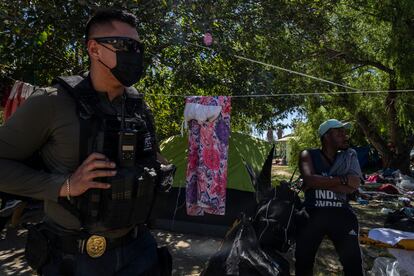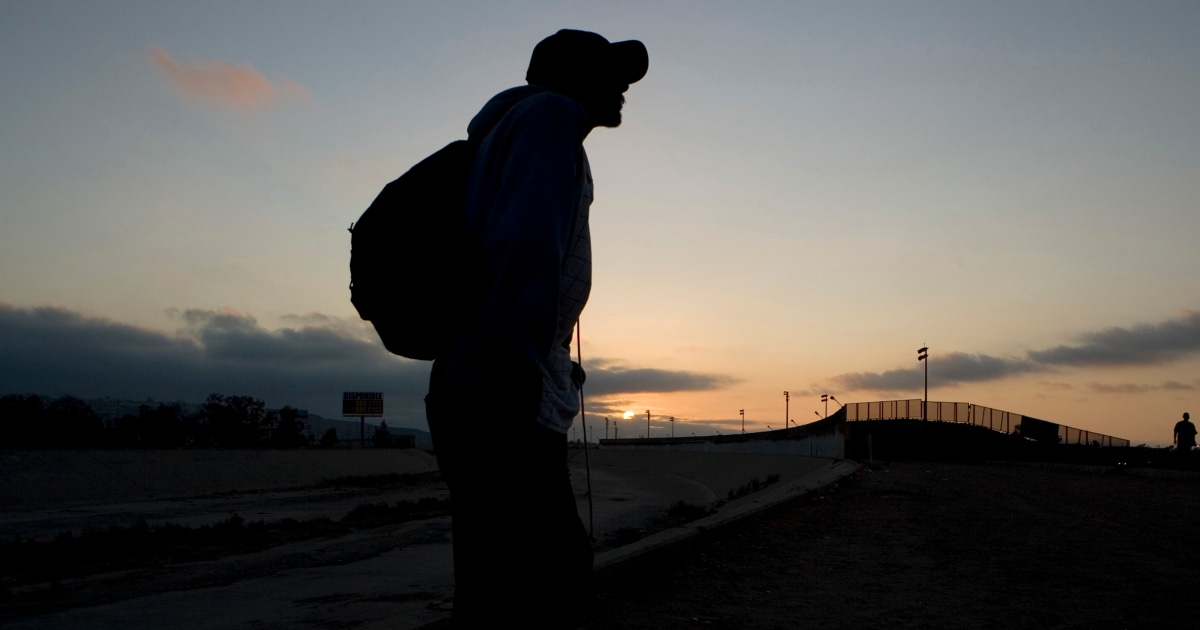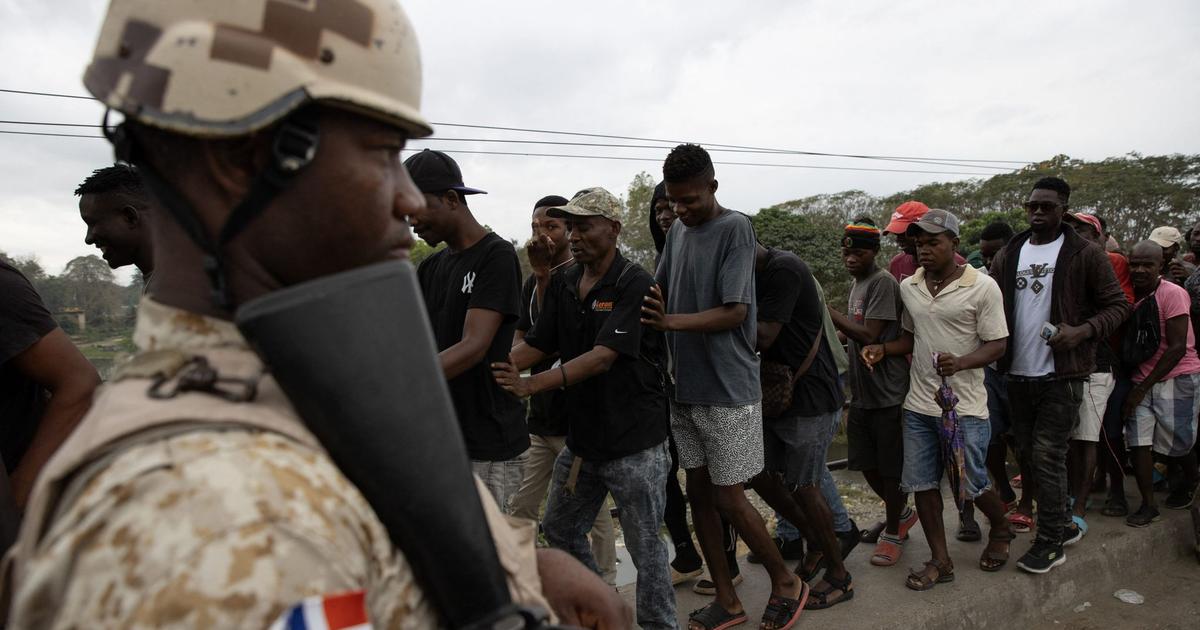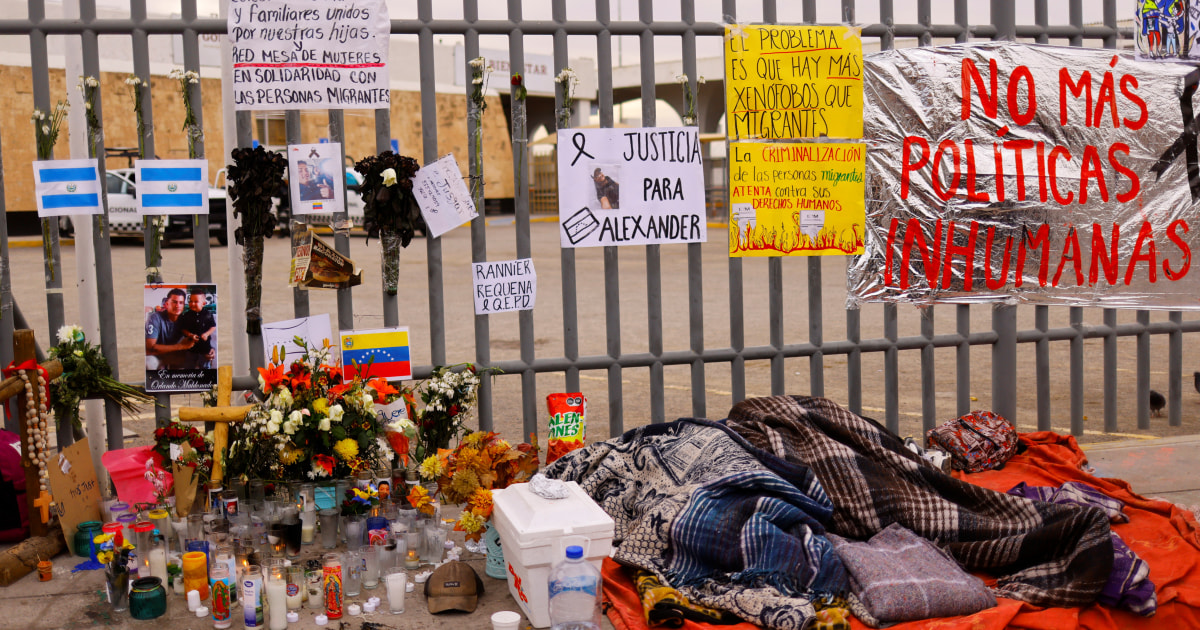The boundary that divides Ciudad Acuña, in Mexico, and Del Río, in the United States, has become an open-air prison.
Thousands of migrants have been surrounded by the authorities on both sides of the border.
On the Mexican side, dozens of adults with children have jumped, once again, into the Rio Grande, pushed by pressure from immigration agents and security forces, who have entered the camp formed a week ago at this point on Thursday. of the State of Coahuila.
With the water as high as it is at eight o'clock at night, crossing is even more dangerous but people tie the bags a little tighter, grab their children by the hands and throw themselves into the river.
More information
"You have to endure to survive": the drama of Haitians on the US border
Mexico near the camp where hundreds of Haitian migrants gather at the border
Dozens of police arrived at the camp early Thursday morning and limited the access that had been open until now.
The immigration agents later joined in and toured the area to convince the migrants to be detained “voluntarily” with the commitment to guarantee them what the authorities have not provided so far.
It did not happen in that camp or in the one that was formed under the international bridge that connects the two border cities: water, food, shelter, toilets, medical services and legal assistance.
"Why don't you come to help us here?" One of the women demanded of the immigration agents who proposed to take her to Tapachula, in Chiapas, a retaining wall in southern Mexico for the caravans arriving from Central America. During their tour of the area where some of the people settled - on cardboard, in tents or under awnings made with cloth or bags - the workers of the National Institute of Migration have insisted that "whoever is happy" in that The situation may remain there and has threatened that there will be “very strong cold”. The agents have been accompanied by members of the Criminal Investigation Agency, while the National Guard, the Action and Reaction Police and several buses have waited outside since the morning.
A Haitian man and his son cross the Rio Grande from Ciudad Acuña (Coahuila) to Del Río (Texas) this Thursday.Teresa de Miguel
“They come to scare you.
They only come to deceive people ”, thinks Jonás Basel, a 31-year-old Haitian who travels with his wife and two daughters.
The man passed through Tapachula on his way from Chile, where most of the migrants who have reached this point come from, and he does not make sense to return to the city bordering Guatemala.
“It is full of people and the Comar [Mexican Commission for Aid to Refugees] is collapsed.
I will not find a permit in three or four months ”, he assures.
In addition, he says, "people are almost without money."
He has 300 left of the $ 10,000 he had for the trip: "We spent everything to get here."
The land on which the makeshift camp on the Mexican side has been set up is federal land that is controlled by the Government of the State of Coahuila. There is a space called Comedor del Migrante, which now people have converted into massive rooms or bathrooms, in the absence of adequate facilities to receive them. On Tuesday the camp began to look like an organized space, with an improvised hairdresser, an afternoon mass, water and food delivered by NGOs and individuals at all hours, tents and the odd mattress. But this Thursday afternoon the spirits are different. "People are depressed, it is very stressful," says a pregnant woman who has not wanted to identify herself.
A police officer from Coahuila walks in the Haitian migrant camp in Ciudad Acuña (Coahuila), this Thursday.Teresa de Miguel
Patrols and agents have blocked the accesses through which migrants enter from the river to buy basic products or charge their cell phones in Mexico, since the exit from the other side is blocked by the US authorities. Some families who had left their belongings ready after the vehicles entered in the early morning decided to cross the river with bags in one arm and children in the other. The river had risen when two women and a minor, about eight years old, set out to cross. On the other side, another migrant came in to help them because after half the way the water began to cover the boy and the toy truck that he carried under his arm. There, another line of patrols awaited them, imposing, a "wall of steel" to slow them down, as Republican Sen. Greg Abbott described it.
The International Committee of the Red Cross (ICRC) has assessed that these migrants are in conditions of "extreme vulnerability" after months of traveling from South America and in the precarious camps where they are kept by the governments of both countries. The ICRC also recalled that the situation in Haiti "is complex" and has called on the authorities to "promote practices that include humanitarian exceptions to protect people." “One way”, defends Lorena Guzmán, coordinator of the ICRC's regional delegation for Mexico and Central America, “could be to provide them with immigration documentation to promote a regular stay in Mexico, minimizing their risks and facilitating their full access to rights on a temporary basis. or definitive ”.
Most of the people in the camp are Haitians who left the country expelled by political and economic instability. The poorest country in the Western Hemisphere suffered a devastating earthquake in 2010 that forced thousands of people to begin an exodus, mainly to countries in South America. The serious humanitarian crisis that the country has suffered for a decade worsened with the assassination of President Jovenel Moïse in June and the impact of the 7.2 magnitude earthquake that left more than 2,000 dead in August.
They left Haiti years ago and now they are in the dilemma between being deported by the United States to that country from which they escaped or being sent back to Tapachula. Many have chosen to retrace their steps and, once again, cross the Rio Grande to the United States. A reverse path to the one they did a few days ago, pushed by the conditions and deportations made by the Joe Biden Administration. "Inhumane" practices, as criticized by the US special envoy for Haiti, Daniel Footeal, who resigned this Thursday.
The rope that connects the two ends between Ciudad Acuña and Del Río was cut this afternoon and there is nowhere to hold on to cross.
Despite what they already know awaits them on the other side, many migrants who have been waiting on the muddy slope that descends towards the shore finally leave because they are afraid and because Mexico does not guarantee them neither the papers, nor the protection, nor the seeking opportunities.
The other side will not welcome you either.
They are trapped between two countries that do not want to receive them.
A Haitian man and his son cross the Rio Grande to Del Rio (Texas) this Thursday.Teresa de Miguel
Subscribe here
to the
newsletter
of EL PAÍS México and receive all the informative keys of the current situation of this country









